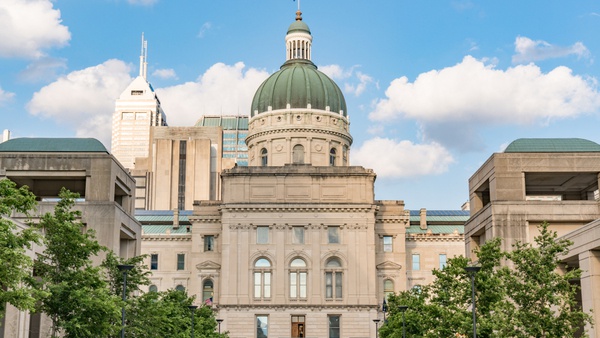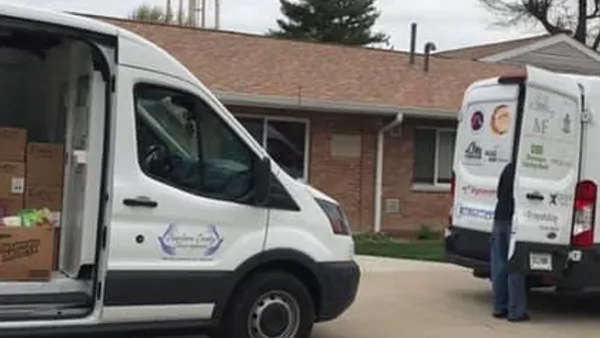The 2021 Legislative Session kicks-off on Tuesday.

Shutterstock photo.
(Indianapolis, Ind.) - The Indiana Chamber of Commerce is asking the state General Assembly to take steps in 2021 to reinforce Indiana’s status as an economic leader in order to help businesses and their workers emerge from the prolonged pandemic.
At its virtual legislative preview today, the organization unveiled the specific policy actions it believes will have the most impact on Indiana’s economic recovery:
- Enhanced legal liability protections for Hoosier businesses if an employee, customer or other person contracts the COVID-19 virus after returning to work or visiting the business
- Raising the state’s cigarette tax to discourage smoking and vaping, plus shore up the state’s finances
- Establishing a work share program that will allow employers to maintain a skilled stable workforce during economic downturns, like what has happened during the current pandemic
- Increasing incentives for attracting remote workers to Indiana to help mitigate the projected losses to its workforce over the next decade (due in large part to Baby Boomers retiring)
- Additional state efforts to further prepare Indiana for the digital economy, including continuing to bring high speed broadband to all corners of the state
“The pandemic was unforeseen and state funds have dwindled, but Indiana is in better position that most and can take charge of how it makes its way back,” says Indiana Chamber President and CEO Kevin Brinegar.
He cautions, however, that businesses should not be penalized for the pandemic in the form of paying more taxes or fees.
“Too many companies have closed and more are barely hanging on. Instead, businesses and the workforce need as much certainty and targeted assistance in the form of incentives and opportunities. That’s how we can protect employers and employment, and start to get more back to normal.”
Brinegar says he’s pleased that protecting businesses and institutions from legal liability regarding COVID-19 is also a priority of legislative leadership.
He also notes that incentives around remote workers and further preparing all areas of the state for new technology are no longer an option but required. “Broadband connectivity – and ultimate consumer adoption – is becoming as important an infrastructure need as water and electricity.”
Two long-standing priorities the Indiana Chamber has pushed for several years reappear on the list and seem to have their best chance of occurring in 2021: Raising the cigarette tax and the state implementing a work share program.
Brinegar explains that beyond the obvious health care advantages for a state lacking in positive health outcomes, “Indiana’s smoking rate is fourth highest in the U.S., and our cigarette tax is the lowest in the Midwest and 37th lowest in the nation. With a critical need for the state to replenish its general fund, the
so-called sin taxes, like on tobacco, are a likely place for lawmakers to start.”
Work share legislation has yet to be voted on by the House or Senate; the Indiana Chamber sees support building for the state to join the 28 others in enacting “this common sense” employment policy.
“Under a work share program, employers can reduce hours without full layoffs, enabling workers to keep their jobs (and benefits) – which, over time, could be returned to full-time status once economic circumstances improve.
“We don’t know how long this recovery is going to take or if there will be more downturns along the way. What we do know is that if Indiana had a work share program currently in place, federal CARES Act money would have covered ALL the unemployment benefits for employees on work share through the end of the year.
“As it is, the state’s unemployment insurance (UI) trust fund had to pay tens of millions of dollars in the benefits for those employees. This, in turn, caused the fund to be depleted faster and the state to borrow more money from the federal government than it would have if Indiana had enacted a workshare program. We can’t afford to get caught without a work share program again,” Brinegar concludes.
A panel discussion featuring all four General Assembly caucus leaders was also part of the annual Indiana Chamber event. The detailed rundown of the group’s legislative initiatives – for 2021 and long term – is available at www.indianachamber.com/priorities.

 Dearborn County Comprehensive Plan Public Workshop Planned for July 24
Dearborn County Comprehensive Plan Public Workshop Planned for July 24
 4th of July Celebrations in Eagle Country
4th of July Celebrations in Eagle Country
 Full Day of Fun Scheduled at City of Greendale 4th of July Celebration
Full Day of Fun Scheduled at City of Greendale 4th of July Celebration
 Dearborn Co. 4-H, Clearinghouse Teaming to Fill the Van
Dearborn Co. 4-H, Clearinghouse Teaming to Fill the Van
 Former Washington Township Trustee Arrested for Theft and Official Misconduct
Former Washington Township Trustee Arrested for Theft and Official Misconduct
 Aurora Police Launch New Drone Program
Aurora Police Launch New Drone Program













